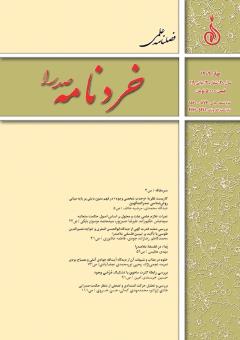بررسی صفت قدرت الهی از دیدگاه ابوالحسن اشعری و خواجه نصیرالدین طوسی با تأکید بر تبیین فلسفی ملاصدرا
محورهای موضوعی : Studies on Islamic philosophy and wisdomمحمد کاظم رضازاده جودی 1 , فاطمه عاشوری 2
1 - استادیار گروه فلسفه و حکمت اسلامی، دانشگاه آزاد اسلامی، واحد تهران مرکزی، تهران، ایران
2 - دانشجوی دکتری فلسفه و کلام اسلامی، دانشگاه آزاد اسلامی، واحد تهران مرکزی، تهران، ایران
کلید واژه: صفات الهی, قدرت الهی, اختیار انسان, ابوالحسن اشعری, نصیرالدین طوسی,
چکیده مقاله :
بحث از صفات واجب تعالی یکی از مسائل مهم مبحث خداشناسی در تاریخ تفکر اسلامی است؛ ازجمله صفت قدرت، تقریرهایی متفاوت را در عرصههای گوناگون معناشناسی و وجودشناسی بخود اختصاص است. پرسشهای مهمی که مبنای اختلافنظر میان متکلمان و فلاسفه بوده، اغلب دربارة حقیقت صفات الهی است. صفت قدرت الهی نیز از آن حیث که هم با صفات علم و اراده الهی و هم با فاعلیت و اراده انسان مرتبط است، مباحثی مختلف میان متکلمان را بدنبال داشته است. این نوشتار، آراء دو متکلم، یعنی ابوالحسن اشعری و خواجه نصیر طوسی، درباب قدرت الهی و مسائل مربوط به آن را در عرصة معناشناسی و وجودشناسی مورد تحلیل و بررسی قرار میدهد؛ در معناشناسی، به «حدوث و قدم عالم»، ذاتی یا فعلی بودن قدرت الهی پرداخته و در حوزة وجودشناسی، عمومیت قدرت الهی و نحوة شمول آن بر افعال انسان و جایگاه اراده و اختیار انسان را بررسی میکند. روش این پژوهش کتابخانهیی و توصیفیـتحلیلی است.
The discussion of the attributes of Almighty Necessary is one of the important issues in the field of theology in the history of Islamic philosophy. Among them, the attribute of power has received different interpretations in various semantic and ontological fields. Some of the important questions that have resulted in disagreements between mutikallimūn and philosophers often concern the reality of divine attributes. The attribute of divine power, since it is related to both the attributes of divine knowledge and will and human agency and will, has created various discussions among mutikallimūn. This paper analytically examines the views of two theologians, Abul al-Ḥasan al-Ashʻarī and Khwājah Naṣīr al-Dīn Ṭūsī, regarding divine power and the related issues in semantic and ontological realms. In semantics, it addresses “the origination and pre-eternity of the world” and the actuality or essentiality of divine power, and in the ontological domain, it explores the universality of divine power and the quality of its inclusion of human acts and the place of human will and free choice. This study was conducted following library and descriptive-analytical methods.
